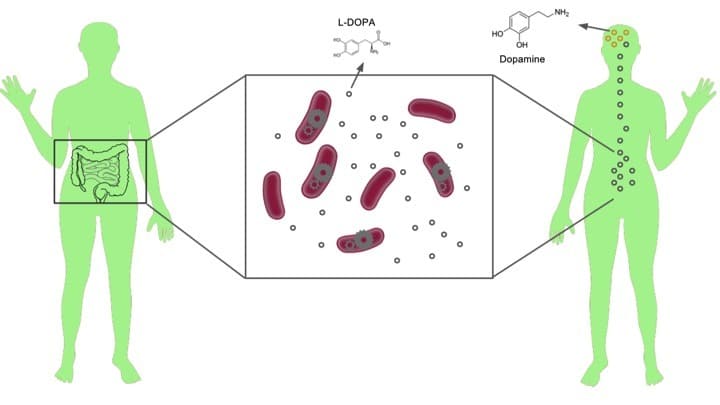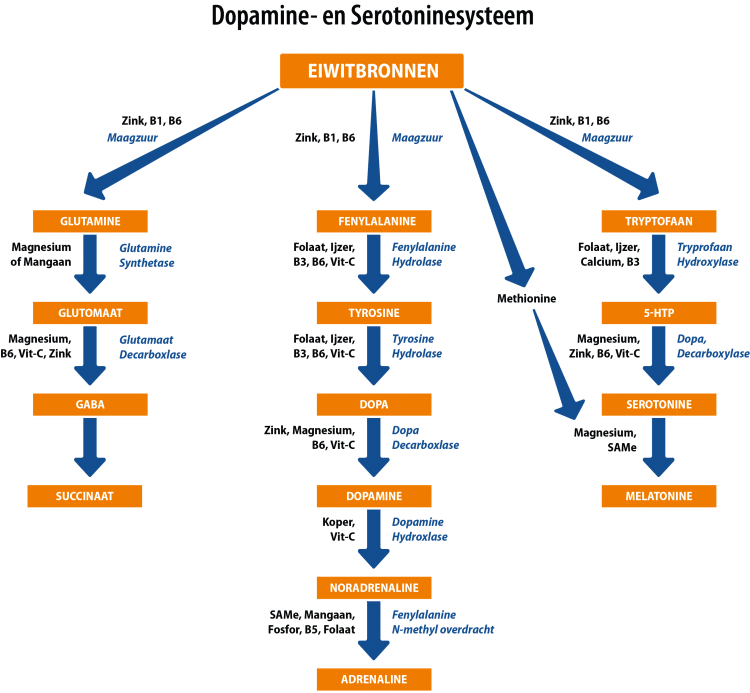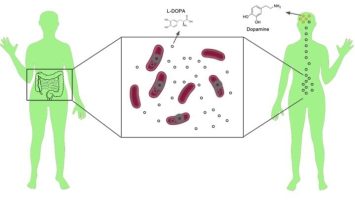Dopamine
More and more studies point the finger at dopamine when it comes to the cause of ADHD and ADD. A deficiency, surplus, hypersensitivity or insensitivity of dopamine is mentioned repeatedly. Even younger studies are looking at why dopamine is imbalanced and it is becoming increasingly clear that the intestinal flora plays a major role in dopamine-related abnormalities.

Intestinal bacteria get the “blame”
According to a study by Radbout people with more bacteria of the Bifidobacterium genus have an increased risk of ADHD because this bacterial species produces the enzyme cyclohexadienyl dehydratase and therefore ensures the synthesis of phenylalanine, a precursor of dopamine.

Bifidobacterium genus
Bifidobacterium genus causes neurotransmitters to become imbalanced. Reducing the population of the Bifidobacterium genus can be done by eating the right food, which causes other strains to grow that then compete for space and nutrition in the intestines. Feed the good (better) bacteria with the right diet and probiotics (especially important after antibiotics).
Read our previous post about this here dopamine in balance with the help of diet and activities
Herbs and plants that can help with ADHD/ADD
In phytotherapy, plants are used to combat certain complaints. These solutions are often temporary in nature, hence the above-described section about intestinal flora. From phytotherapy, these plants are recommended for use in ADHD and ADD.
The right omega 3 and 6 fatty acids
The omega 3 and 6 fatty acids below can be used for a longer period and also have long-term usefulness.
As a source of omega 3 fatty acids: Linseed oil (Linum usitatissimum) and Black Nettle oil (Perilla frutecens).
As a source of omega 6 GLA (gamma linolenic acid): Borage Oil (Borogo Officinales), Middle Evening Primrose Oil (Oenothera Biennis) and Black Currant Seed Oil (Ribis Nigrem).
Soothing herbs and plants
The herbs below work temporarily and can be used to combat symptoms.
Plants and herbs with a soothing effect on nervousness, irritability, restlessness and aggressiveness: Valerian (Valeriana officinales), Oats (Avena sativa), Nightcap (Escholzia californica), Nightcap herb (Griffonia simplicifolla), Hops (Humulus lupulus), Chamomile (Matricaria recutita L.) Passionflower (Passiflora incarnata L.) and Small-leaved lime (Tilia Cordata).
To improve memory and learning new things: Brain tonic (Bacopa monnieri).
Essential oils for use on the skin or massage for relaxation: Lavender (Lavendula vera), Chamomile (Matricaria recutita L.), Roman Chamomile (Chamaemelum nobile) and Bitter Orange Apple Tree Flower (citrus aurantium).
Essential oils for relaxing in the bath: Lavender (Lavendula vera), Roman Chamomile (Chamaemelum nobile), Lemon Balm (Melissa officinales) and Bitter Orange Apple Tree Flower (Citrus aurantium).
Diffusing/vaping/aromatherapy the essential oils of the above soothing herbs is possible, but these are recommended: Lavender (Lavendula vera) and Orange (Citrus sinensis).
Warning
A number of plants and herbs described may have contraindications and/or may not be used for longer than a certain time and in a certain quantity. Consult your specialist before using these herbs, especially those for relaxation and/or if you have multiple conditions.
